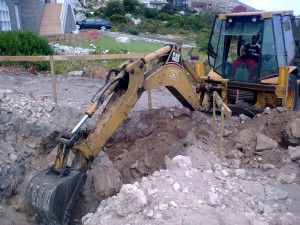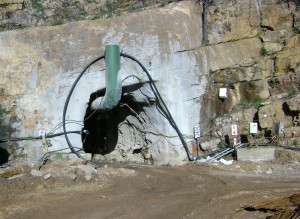CHAPTER < NINE CONTD - RETHINKING BASIC ASSUMPTIONS
The following are some of the most insidious examples of erroneous thinking of our time:
There’s Always More Where That Came From
In the movie “Wall Street” the main protagonist, Gordon Gekko, played by the actor Michael Douglas, shouts out the words “Greed is good” to a conference room full of company shareholders. He is wildly cheered and applauded for voicing the dark side of the American dream and these words sound entirely plausible within the context of the scene in this movie, which is an examination of rampant 1980s self-interest at work in the American corporate system. This pretty much sums up the thinking of the latter part of the 20th Century.
 Hand in glove with this thinking went the mindset that nature was infinite. That nature was there to serve us. That disposability and planned obsolescence equaled profitability. That constant growth and demand were positive forces and that environmentally damaging activities were justifiable in order to drive a world economy that was spiraling ever upwards. Consequently it was easy to rationalise away the plunder of the Earth’s resources on a scale never before attempted.
Hand in glove with this thinking went the mindset that nature was infinite. That nature was there to serve us. That disposability and planned obsolescence equaled profitability. That constant growth and demand were positive forces and that environmentally damaging activities were justifiable in order to drive a world economy that was spiraling ever upwards. Consequently it was easy to rationalise away the plunder of the Earth’s resources on a scale never before attempted.
Practices such as discounting over distance enabled nations in some parts of the world to close their eyes to the reality of ecological ransacking in other parts of the world and a self-centered, isolationist, island mentality enabled such practices to exist in the first place. However, the stark reality of the 21st Century is quite different.
In our present ecological circumstances there is no way that greed can ever again be seen as being good, for we now live in a world where there is no longer always more where that came from. We now know that the supply of essential non-renewable raw materials and other resources is exhaustible and that stockpiling is not the answer over the long term, regardless of the ability to be able to afford to do so in terms of material wealth. Because stockpiling in some parts of the world could mean dwindling supplies in other parts of the world. And over time this imbalance could lead to a net global deficit with all its dreadful ecological implications, as well as the possibility of competitiveness for these last remaining resources spilling over into deadly conflict. With the arsenal of frightening weapons at our disposal, this is a possibility that we dare not entertain.
I’m All Right Jack
The individual is undeniably the primary unit of humankind. However, the last decades of the 20th Century were characterised by a mindset that set undue store by the individual. It was the era of the “me-decades” when “me-ness” abounded and the individual was king. Along with this overemphasis on individual needs and rights flourished an attitude of expanded expectations and voracious entitlement. In fact this period of human history became known as the Age of Entitlement, during which our individual personal interests took precedence over the interests of the collective and in the process the entire focus of our lives changed.
The post-war baby-boomers of the affluent Western world became known as the “me-generation”, and with this dramatic paradigm shift “me-ism” drowned out “us-ism”, until we had moved away from the value system of our forefathers; a creed that had emphasised mutual co-operation, consideration and support as essential preconditions for survival.
 Looking out for Number One became big business. However, for many people it meant that self-interest precluded friendship, with generosity of spirit and altruistic involvement in other people’s lives, flying out of the window. “I’m all right Jack”, effectively became one of our defining cultural cornerstones and with it we lost the attitudinal bedrock of our species. With this incursion into rampant self-interest confusion reigned as certainty over roles, responsibilities and life tasks became blurred.
Looking out for Number One became big business. However, for many people it meant that self-interest precluded friendship, with generosity of spirit and altruistic involvement in other people’s lives, flying out of the window. “I’m all right Jack”, effectively became one of our defining cultural cornerstones and with it we lost the attitudinal bedrock of our species. With this incursion into rampant self-interest confusion reigned as certainty over roles, responsibilities and life tasks became blurred.
Within the family, this paradigm shift took the emphasis from the good of the family unit and replaced it with that of the individual family member. In many families around the world, this changed attitude translated into either one or both parents believing that it was their right to go off and find themselves in various activities and relationships outside the family unit, or in different places of contemplation, leaving their families to fend for themselves.
With an increasing number of fathers going off into the sunset, mothers left with the challenge of raising their children single-handedly, were propelled into the pace and competitiveness of an unforgiving workplace. Acting on the necessity to compete, as well as the strident cue from the women’s movement which stressed personal achievement and fulfillment at all costs, meant that many women reduced their lives to a blinkered focus on their careers, often to the exclusion of all else. And children, with the example set by parents each going about their own lives and doing their own thing without much thought for anyone else, also learnt to go their own way and do their own thing, reinforcing in another generation this rising tide of rampant self-interest.
From the most basic and important building block of society, the family unit, this attitudinal and behavioural tide washed into every corner of our lives, flooding upwards, downwards and sideways until it had infiltrated into the loftiest global corridors of power. Once there, it permeated the thinking and decisions of politicians and bureaucrats, and in the process the control and management of vital resources all too frequently became currency for political maneuvering and personal gain.
On the ground this ethical malaise translated into government policies that patently did not take the big picture into account. The result were practices that have harmed rather than benefited the majority of world citizens and from a global perspective, this has meant that greed, corruption and short-sighted self-interest have virtually guaranteed ecological bankruptcy in many parts of the globe. As we progress further into the 21st Century, it is glaringly obvious that unless we change this thinking, and with it the malignantly self-serving practices that have brought us to this point, none of us will be all right, Jack.
Might Is Right
Svetlana Alliluyeva, the daughter of Marshall Joseph Stalin and one of the people closest to him, was able to observe first-hand and at close quarters the effects of unchecked power. Growing up in her father’s official residence in Soviet Russia, she had ample opportunity as a child, and then as an adolescent, to reflect on the destructiveness of the policy “Harm thy neighbour, before thy neighbour harms thee” as many members of her family, including her mother, were systematically destroyed by Stalin’s tyrannical ambition.
As an adult she was later able to compare two ideologically opposite approaches to life; the ruthless power mongering of Stalin who ruled communist Russia with an iron fist and the humane philosophy of Brajesh Singh, her Indian friend, rejecting the one and embracing the other. As Svetlana wrote in her book Only One Year: “What two approaches to life could have differed more drastically? The tolerance of one, the dogmatism of the other: calm and fear, trust and suspiciousness, modesty and ambition, forgiveness and revenge, kindness and wrath, the strength of the spirit and the strength of arms.”
After renouncing the Godlessness of Soviet Union communism, Sveltana Alliluyeva was baptised in the Orthodox Church, and it was upon reflecting back over her life after her baptism that she observed: “And it was then that my father’s whole life stood out before me as a rejection of Wisdom, of Goodness, in the name of ambition, as a complete giving of oneself to Evil. For I had seen how slowly, day by day, he had been destroyed by evil, and how evil had killed all those who stood near him. He had simply sunk deeper and deeper into the black chasm of the lie, of fury and pride. And in that chasm he at last had smothered to death.”
Stalin’s slide into darkness, according to his daughter, was the result of untrammeled power. As the supreme military ruler of the Soviet Union, he was able at a whim to exile people to the furthest reaches of frozen Siberia, or in a fit of pique to order their execution without trial or normal investigation. Consequently, few people chose to oppose him for fear of repercussions out of all proportion to their opposition.
In his personal and political life Stalin was rude, autocratic and arrogant, and he believed and acted on the premise that his power gave him the unopposed right to do as he wished. Instead of creating positively with the influence of judicious power, he chose to destroy with the negativity of absolute rule. And in the end this power, untempered by any moderating influence, destroyed him. In the words of his daughter Svetlana, “At the peak of his glory and power he had experienced neither happiness nor satisfaction; instead, he was tormented by an eternal fear. Having created a void around himself, he then led up a blind alley all those who had gone on blindly believing in him”.
There is a powerful lesson to be learnt in the story of Stalin and that is that unchallenged power, used unwisely, has the capacity to destroy from the inside out as well as from the outside in. From the ancient dynasties of Imperial China, through the republics of the Roman Empire, to the monarchical reigns of Great Britain, virtually every major civilisation since recorded time has been propped up by the conscious and unconscious presumption that the mightiest are the worthiest. It has been the underpinning philosophy of capitalism.
Yet even communism, the supposed leveler of humankind, has its ruling class with its corresponding access to disproportionate power. More recently, during the second half of the 20th Century, this assumption spread across society reaching to its furthest possible point across the globe. The premise for this mindset was that the power to obtain the wherewithal, either through fair means or foul, entitled the powerful to have their wishes granted and their actions executed, often with little fear of long-term repercussions.
The result of power without broad-picture accountability enabled the government of one of the world’s most pro-nuclear countries, France, despite worldwide outcry and the boycotting of French products in some countries, to continue underground nuclear testing long after other more prudent nations halted the practice. And with the might to prowl the ocean in powerful sea-going vessels, the government of Japan seized the right to continue hunting whales on the premise of scientific study, whilst more ecologically-enlightened nations halted whale hunting altogether.
Even in the United States, the world’s biggest producer of greenhouse gasses, the Bush administration decided that, despite evidence of the danger to the global environment caused by greenhouse emissions, the United States would not ratify the Kyoto Protocol. By taking this stance, it effectively put economics and the interests of a comparative few before those of the majority of world inhabitants. However the “might is right” ethic unfortunately has not begun and ended at a national level.
 With short-term gain as their motive, many corporations have also seen fit to undertake harmful and unfair practices with little restraining intervention: practices such as the mining of oil in the Niger Delta which has caused extensive environmental damage to vast tracts of land, polluting important sources of water. This has had far-reaching and long lasting consequences for thousands of people living in the area, many of whom have had to evacuate their homes and the fields that constituted their livelihood.
With short-term gain as their motive, many corporations have also seen fit to undertake harmful and unfair practices with little restraining intervention: practices such as the mining of oil in the Niger Delta which has caused extensive environmental damage to vast tracts of land, polluting important sources of water. This has had far-reaching and long lasting consequences for thousands of people living in the area, many of whom have had to evacuate their homes and the fields that constituted their livelihood.
However, knowing this, knowing that the “might is right” mindset effectively eliminates consideration for the broader picture; this short-sighted thinking has continued to play a part in corporate operating procedures across the globe. Unfortunately individuals have also subscribed to the belief that their money, power and position guaranteed them the right to do as they pleased, without fear of repercussions or any regard for the effects of their actions on the broader picture. Because of this malignant mindset, people thinking only of their short-term personal gain have exploited many terrestrial and marine species up to and even beyond the point of extinction through greed and ignorance.
In a world teetering on the brink of catastrophe, the day of reckoning for these perpetrators is fast approaching. Unfortunately their actions threaten to take the rest of us down with them. Affluence and position, cast-iron protectors in the past, will be useless shields against the particular ecological and sociological woes of this century; for they will be unable to guarantee a safe and secure future for the world’s privileged on a planet damaged beyond its ability to recover. All they will be able to do in the medium term is buy time.
 For how can money buy clean air once the planet’s atmosphere has become too poisoned to breathe? How can wealth purchase water if all the rivers have run dry? How can position secure space when the globe has become too populated for comfort? How can privilege restore forests and wetlands and polar ice sheets that have disappeared forever? How can status bring back plant and animal species that have been tipped over the abyss of extinction? An attitude of “might is right” is not the answer to these potential woes of the 21st Century. In fact this mindset is the very antithesis of what will be needed in the time to come.
For how can money buy clean air once the planet’s atmosphere has become too poisoned to breathe? How can wealth purchase water if all the rivers have run dry? How can position secure space when the globe has become too populated for comfort? How can privilege restore forests and wetlands and polar ice sheets that have disappeared forever? How can status bring back plant and animal species that have been tipped over the abyss of extinction? An attitude of “might is right” is not the answer to these potential woes of the 21st Century. In fact this mindset is the very antithesis of what will be needed in the time to come.
Don’t Worry We’re in Control
Feeling in control of one’s life and destiny is a profound human need and the feeling of being out of control is one of our greatest human stressors. Yet the fact remains that we actually have very little control over our relationship with the planet on which we live and depend, and the solar system within which it revolves. It seems, if we are to take an anthropomorphic viewpoint that the Earth and the heavens allow us to go about our minuscule business for a while letting us believe that we have things under control, before jolting us out of our complacency with a show of temperament that conclusively demonstrates that we’re not in control at all.
he Sun’s tantrums are evidenced by violent solar flares, seen as sunspots that explode on the Sun’s surface with the force of millions of Hiroshima-type bombs, as well as coronal mass ejections; which together with sunspots, spew ultraviolet radiation, electro-magnetic waves and electrically charged particles and gas out into the solar system. Within a day this galactic bombardment reaches Earth, colliding with Earth’s magnetic shield causing magnetic disturbances as well as fluctuations in atmospheric pressure and electricity, among other anomalies.
A dramatic illustration of the havoc that one such solar eruption can wreak here on Earth occurred on a frosty night in early March 1989, after a large sunspot appeared on the Sun. It began emitting powerful flares and this explosive outpouring of high-energy particles caused a fierce magnetic storm to trip the circuit breakers at the James Bay generating station in Canada at 2:44 a.m. Eastern Standard Time. Within minutes the entire power system of Quebec Province had collapsed, disrupting the lives of millions of Canadians. Powerful solar flares had also affected the electrical power systems of Ontario and British Columbia, parts of the United States and Sweden.
 When the people living in Quebec and Montreal, the areas hardest hit by the magnetic storm, woke up on that cold March morning, it was to find that their houses had cooled during the winter night. They were unable to make breakfast or heat water for washing, the subway had closed and traffic in the streets had jammed. However, beyond the inconvenience of having household electrical appliances and suburban utilities cut, as well as the services of airports, hospitals, police and fire stations paralysed; radio communication was affected, disrupting all kinds of telecommunications, including marine and navigational signals worldwide.
When the people living in Quebec and Montreal, the areas hardest hit by the magnetic storm, woke up on that cold March morning, it was to find that their houses had cooled during the winter night. They were unable to make breakfast or heat water for washing, the subway had closed and traffic in the streets had jammed. However, beyond the inconvenience of having household electrical appliances and suburban utilities cut, as well as the services of airports, hospitals, police and fire stations paralysed; radio communication was affected, disrupting all kinds of telecommunications, including marine and navigational signals worldwide.
The overall cost of the violent sunspot, in terms of dollars, was astronomical. Commercial satellites were damaged resulting in malfunctions, burned circuits, loss of altitude control fuel and reduced orbital lifetimes. Some businesses, as well as a General Motors car-assembly plant, lost costly production. A steel manufacturer was forced to scrap over a million dollars worth of steel caught in hot rolling mills at the time of the blackout and power companies were forced to spend hundreds of millions of dollars in order to upgrade their equipment to prevent further such outages…
Merci pour vos commentaires. Les grands parents éloignés de Nancy peuvent ainsi suivre les compétitions des « pitchounets ». Continuez !